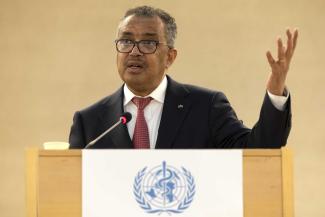Covid-19
Position of the WHO at the beginning of the pandemic

This trend is weakening the authority of the WHO. For example, its recommendations regarding the 2014 Ebola epidemic, a serious international health crisis, were implemented only insufficiently or not at all. Moreover, the WHO has long been chronically underfinanced and understaffed by member states.
The geopolitical climate at the beginning of the pandemic was marked by economic and political tensions between the USA and China. They led to an early and pronounced politicisation of the Covid-19 debate and affected the work of the WHO.
The architecture of the WHO is conflict-prone too. There are inherent tensions between the independent work of the secretariat, the executive and the sovereign interests of the 194 member states. The duty to take care of all people’s health rights is enshrined in the WHO’s constitution, but it must also navigate centres of power in nation states. All too often, however, national governments focus more on corporate interests than on public health even in their own country.
This dualism is also evident in how the normative function of the WHO on health issues diverges from its tangible work in member countries. Things are particularly striking when it comes to declaring a public health emergency of international concern (PHEIC). In such emergencies, local operations of WHO country offices and onsite teams often have a bearing on national sovereignty. The dualism was obvious before the pandemic. The authority of the WHO and its ability to criticise members states in the name of global health are limited by its financial and political dependence on member nations.
Andreas Wulf is the Berlin representative of medico international, a civil-society organisation.
wulf@medico.de
Anton Sundberg is a student assistant at medico international.








